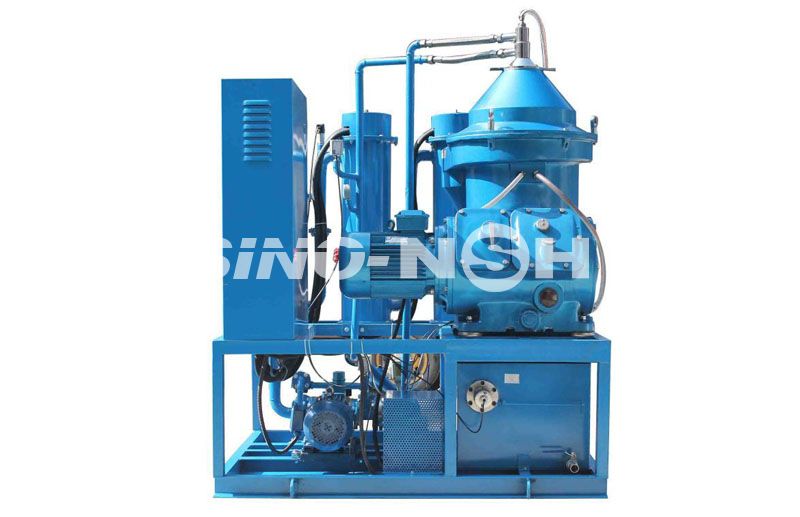The purpose of a lubricating oil purifier is to clean and restore the quality of lubricating oil used in engines, turbines, compressors, and other industrial machinery. Over time, lubricating oil becomes contaminated with dirt, water, sludge, wear particles, and other impurities, which can degrade its effectiveness and lead to equipment damage. A lubricating oil purifier is designed to remove these contaminants, thus improving the oil’s performance, extending the life of machinery, and reducing maintenance costs.

Here’s a more detailed breakdown of the key purposes and functions of a lubricating oil purifier:
1. Removing Contaminants (Particulates and Sludge)
- Dirt and solid particles accumulate in lubricating oil from both external sources (such as dust and debris) and internal sources (like metal wear from engine or machinery parts). These particles can cause abrasion and damage to critical components of machinery.
- A lubricating oil purifier removes these solid contaminants, preventing premature wear and maintaining smooth operation.
2. Water Removal
- Water contamination in lubricating oil can lead to several problems, including:
- Oxidation of the oil, which leads to the formation of acids and sludge.
- Corrosion of metal parts, leading to rust and eventual failure of components.
- Emulsification of oil, causing loss of lubricating properties.
- A lubricating oil purifier removes both free water (visible water droplets) and dissolved water (microscopic water trapped in the oil), helping to restore the oil’s effectiveness and protect the machinery from damage.
3. Gas Removal
- Dissolved gases (such as air or nitrogen) can lower the oil’s viscosity and make it less effective at lubrication. The purifier removes dissolved gases through a process like vacuum de-gassing, which helps restore the oil to its optimal state for proper functioning.
- Removing dissolved gases also helps reduce foaming in the oil, which can cause pump cavitation and lead to inefficient lubrication.
4. Restoring Lubricating Oil Quality
- A lubricating oil purifier can regenerate used oil by removing contaminants, improving its viscosity, lubrication efficiency, and overall quality.
- By extending the life of the oil, the purifier delays the need for oil changes, saving costs on oil replacements and disposal.
5. Improving Oil’s Lubrication Performance
- Clean oil provides better lubrication, which helps reduce friction and wear between moving parts, leading to longer equipment life and reduced downtime.
- By maintaining optimal oil properties, the purifier ensures that the machinery operates at peak efficiency, preventing problems like overheating and excess wear.
6. Prevention of Oxidation and Formation of Sludge
- Contaminants like water and particulate matter in the oil can accelerate oxidation and lead to the formation of sludge, which can clog oil passages and degrade performance.
- The oil purifier helps prevent this by removing contaminants that promote oxidation and sludge buildup, keeping the oil clean and effective.
7. Enhancing Equipment Reliability
- Regular use of an oil purifier ensures that the lubricating oil remains in optimal condition, which contributes to the reliability and performance of equipment. By preventing the oil from degrading, you reduce the likelihood of operational failures and unplanned downtime.
- In high-stakes industries like power generation, manufacturing, and transportation, having clean oil in machinery is crucial for minimizing the risk of equipment breakdowns.
8. Cost Savings on Oil and Maintenance
- Extending the lifespan of lubricating oil reduces the frequency of oil changes, which results in cost savings on both oil purchases and disposal.
- The purification process also reduces the need for expensive repairs caused by contaminated oil, resulting in lower overall maintenance costs and increasing equipment uptime.
9. Environmentally Friendly
- By purifying and reusing lubricating oil, a purifier helps reduce the need for new oil, which contributes to environmental sustainability by minimizing the waste oil that needs to be disposed of or recycled.
- The process also reduces the environmental impact of oil extraction and transportation, as less oil needs to be produced and consumed.
10. Reduction of Wear and Tear
- When lubricating oil is contaminated, it fails to provide effective lubrication, which accelerates wear and tear on engine parts, gears, turbines, and other machinery.
- The purifier removes contaminants that can cause wear, such as carbon, metal particles, and other debris, ensuring that machinery operates with minimal wear and remains efficient for longer periods.
11. Prevention of Foaming
- Air and water in lubricating oil can cause foaming, which leads to ineffective lubrication and potential damage to the machinery. The purifier removes these contaminants and helps maintain the oil in a foam-free state.
- This is especially important in systems with pumps and lubricated bearings, where foaming can lead to cavitation and oil starvation, both of which can damage equipment.
12. Optimizing Oil Additives
- Oil additives, such as anti-wear agents and antioxidants, help improve the performance of lubricating oil. However, contaminants like sludge or water can dilute or deactivate these additives.
- A purifier helps keep the oil clean so that additives remain active, ensuring that the oil maintains its full performance capabilities.
Summary of Key Purposes:
- Contaminant removal (water, dirt, particulates, gases)
- Restoring oil quality and improving lubrication
- Extending the life of both oil and equipment
- Reducing maintenance and operational costs
- Preventing oxidation, corrosion, and sludge formation
- Environmental sustainability by reducing oil consumption
Applications:
Lubricating oil purifiers are used in a variety of industries and applications, including:
- Marine engines
- Turbines (gas and steam)
- Compressors
- Industrial machinery
- Automotive and heavy-duty engines
- Power plants and refineries
In essence, a lubricating oil purifier helps ensure that machinery operates efficiently, reliably, and economically by maintaining high-quality oil and preventing damage due to contamination. Would you like more details on specific types of lubricating oil purifiers or manufacturers?

